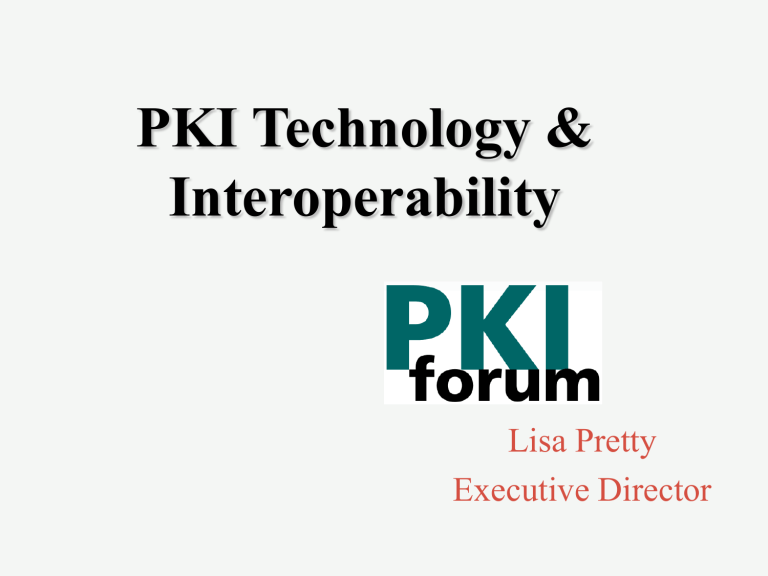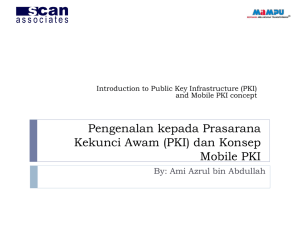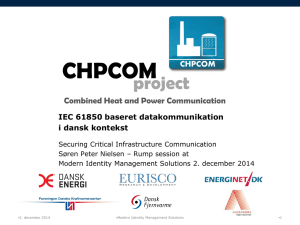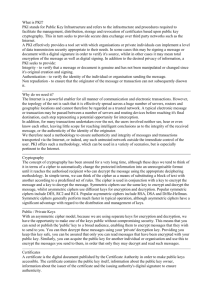PPT - oasis pki

PKI Technology &
Interoperability
Lisa Pretty
Executive Director
Speakers
Overview & Interoperability – Lisa Pretty,
PKI Forum
Hardware Security Modules – Bill Franklin, nCipher
Tokens – Bill Wehrmacher, DataKey
Certificate Lifecycle
Certificate
Revocation
Certificate
Publication
Directory
Services
Certificate
Generation
CA Certificate
Expiration
RA
End
Entity
Certificate
Archiving
Verification of Applicant
PKI Interoperability
Three different aspects to PKI interoperability
– Component interoperability
– Enterprise interoperability
– Application interoperability
PKI Component
Interoperability
Ability to mix and match COTS PKI products
CA
Depends upon specification-based messages exchanged between components to support:
– Certificate requests
– Certificate renewal
– Certificate revocation
Repository
Client
RA
Factors For Component
Interoperability
Algorithm suite
Certificate management protocols
– Certificate issuance
– Certificate revocation
Transport mechanisms
Enterprise Interoperability
The ability to connect two enterprise PKIs into a larger functional
PKI
– More than just crosscertification
– Clients must be able to find and validate meaningful certification paths
Enterprise A PKI
CA RA
Repository A
Client
Client
CA
Repository B
RA
Enterprise B PKI
Factors for Enterprise
Interoperability
Algorithm suite
Certificate format and extension set
Certificate policies
Certificate status information formats
Path building and validation across PKIs
Application Interoperability
The ability of PKI-aware applications to:
– Share PKI certificates, key-pairs, and processing modules
– Rely on different PKI environments to implement security services
Enterprise A PKI
CA RA
Repository A
Client
Client
CA
Repository B
RA
Enterprise B PKI
Factors for Application
Interoperability
Ability to share cryptographic modules OR export/import cryptographic materials
– Cryptographic application programming interfaces (APIs)
Access to path validation and path building utilities
Consistency of processing
Feature sets
Hardware Security
Modules (HSM) and
PKI
Bill Franklin
Dir. of Technology, nCipher
Hardware Security Modules
Hardware security modules (HSM) perform cryptographic operations, protected by hardware
(PCI boards, SCSI boxes, smart cards, etc.)
These operations include:
– Random number generation
– Key generation (asymmetric and symmetric)
– Private key hiding (security) from attack (no unencrypted private keys in software or memory)
• Private keys used for signing and decryption
• Private keys used in PKI for storing Root Keys
About Public Key, ---?
We assume you understand something about public key technology:
– Public-private key pairs; generation and life cycle
– Asymmetric encryption
– Symmetric encryption
– Use of asymmetric encryption to establish keys for subsequent symmetric encryption
– Criticality of private keys (and root keys)
Why Use HSMs?
A number of public key operations require the use of private keys as part of various processes:
– Cryptographically or digitally signing an object, a file, etc.
– Decrypting an encrypted object or file
These processes happen in active memory, which is vulnerable to attack and copying of a private key in open use, unencrypted
HSM – Immediate Needs
SSL predominates in e-commerce:
– Allows secure electronic transactions
Effect on servers:
– SSL negotiation (asymmetric) creates heavy overhead – increasingly a bottleneck
– Private keys have to be brought into decryption and signing processes, interactively
So, SSL can drive:
– Insecurity if private keys not protected fully
– Bottlenecks in processing, even bringing servers down
HSM Basics
HSMs generally hook directly to the server , providing a protected area for the private key to be generated and reside , as well as to participate in a protected manner in critical processes , such as signing and decryption -- such that the private key is never in active memory or software in an unencrypted state.
PKI Implications
If you have just spent $15M implementing a global PKI – and your root is compromised, or some other important signing key…
What will it cost you to refit all new certificates – as well as inspecting and changing all the operations associate with the compromised key(s)?
It will be more than you spent setting up initially!
Or, transactions are suddenly 8000% over design expectations – how will you scale?
Desirable Characteristics
HSMs should:
– Resist physical and programming attacks of all types
(our catechism is: NO Private keys unencrypted in software or memory – any time); generate random numbers and keys in HSM
– Make private keys securely available to transaction processes in real time, securely – particularly CAs
– Allow “k of n” security for access to HSMs with security “in depth”
– Accelerate cryptographic processing
– Be scalable and support failover
– Operate with load balancing schemas
– Work with PKCS#11, MS CAPI and other APIs
Need Further Information
Check with the PKI Forum site for members which have HSMs (www.pkiforum.org)
Work with your integrator or consultants to identify the best solutions for your implementations and operations
Work with your PKI vendor concerning solutions for HSM
But: Use HSM to assure your security!
HSM Example: nCipher HW slide 20
PCI
SCSI
Example: nCipher Hardware
RISC Processor Array
Each CPU can perform - 37 1/2
1024 bit decryptions per second
Secure Memory
Example: nCipher Hardware slide 22
The master processor performs crypto operations and parsing to other chips
“Master” Processor
Other CPU’s perform only crypto operations
The smart token’s role in
PKI interoperability.
W.H.(Bill) Wehrmacher
Datakey, Inc.
1st: Do no harm!
Then help if you can!
Just what is a Smart Token?
Physical Device
– Potential for two Factor Authentication
– Potential for secure portable Credentials
Computing Device
– Potential for Strong Authentication
– Potential for Non Repudiation
Convenient Form Factors
– Potential for regular use
What do you mean by interoperate?
The definitions for tokens are the same definitions about PKI in general.
– I want my PKI trust system interoperate with others’
PKI trust systems
– I want my PKI credentials to work across applications
There is more with Tokens
– “OK, now I have have keys and Certificates on my token, I should be able to plug it into any PKI enabled application, in any workstation and have it just work.”
What does the user mean by interoperate?
“OK, you’ve convinced me, I need tokens.
– Now I can work anywhere,
– any time,
– on any computer,
– with any application,
– and on and on and on…”
“OK, now I have have keys and Certificates on my token, I should be able to plug it into any PKI enabled application, in any workstation and just have it work… Right?”
Define where you want interoperability
At card edge...
At Card Operating System ...
At card terminal ...
At connection API ...
At Cryptographic API ...
Across desktop platforms ...
Across PKI Systems ...
Token Interoperability Stack
ISO 7816
Applications: Secure and non-secure
Security Mechanisms and protocols
Token Connectivity APIs
Security Support
Services
Crypto Modules and Algorithms
PKI functions:
Key & Certificate
Management
Auditing etc.
CAPI/CSP,
Cryptoki
PC/SC,
OCF etc.
Token Connectivity hardware
Tokens
At Card Edge with ISO 7816?
A little like saying RS232 Compatible
– Card will fit in slot
– Contacts will line up
– Power and signals will go to right place
– Card will identify itself with
A nswer T o R eset
– Many low level commands will work
– Most functional commands won’t
Probably not core definition of interoperability, but will be part of the equation
Token Interoperability Stack
ISO 7816
Applications: Secure and non-secure
Security Mechanisms and protocols
Token Connectivity APIs
Security Support
Services
Crypto Modules and Algorithms
PKI functions:
Key & Certificate
Management
Auditing etc.
CAPI/CSP,
Cryptoki
PC/SC,
OCF etc.
Token Connectivity hardware
Tokens
At Card Edge Operating
System:
CARDOS
DKCCOS
EMV
JavaCard
Multos
SEIS
SpyCOS
Windows for Smart
Cards
Not really practical to interoperate here…
At Operating System
Algorithm Suite:
RSA
DSA
ECC
PGP
Others, new and old
DES and derivatives
RCx
IDEA
CAST
Others, new and old
Necessary to support wide range of applications
Token Interoperability Stack
ISO 7816
Applications: Secure and non-secure
Security Mechanisms and protocols
Token Connectivity APIs
Security Support
Services
Crypto Modules and Algorithms
PKI functions:
Key & Certificate
Management
Auditing etc.
CAPI/CSP,
Cryptoki
PC/SC,
OCF etc.
Token Connectivity hardware
Tokens
At Token Terminal
Platform Dependent
– PC/SC
• WinTel 32 Platforms only
• Limited performance with Cryptographic Smart
Cards
– OpenCardFramework
• Java oriented
Token Interoperability Stack
ISO 7816
Applications: Secure and non-secure
Security Mechanisms and protocols
Token Connectivity APIs
Security Support
Services
Crypto Modules and Algorithms
PKI functions:
Key & Certificate
Management
Auditing etc.
CAPI/CSP,
Cryptoki
PC/SC,
OCF etc.
Token Connectivity hardware
Tokens
At Cryptographic or other API
Cryptoki (PKCS#11): Lowest Level of popular
APIs
CAPI (Microsoft Cryptographic API)
Both supported by existing products
ActivCard: ActivCard Gold Litronic: NetSign
Datakey: SignaSURE CIP
GemPLUS: GemSafe
Schlumberger
Others
Both Supported by PKI products
For a list, see the PKI Forum Member list and there are others
Token Interoperability Stack
ISO 7816
Applications: Secure and non-secure
Security Mechanisms and protocols
Token Connectivity APIs
Security Support
Services
Crypto Modules and Algorithms
PKI functions:
Key & Certificate
Management
Auditing etc.
CAPI/CSP,
Cryptoki
PC/SC,
OCF etc.
Token Connectivity hardware
Tokens
Perhaps now you have token hooked up. What next?
Rule #1: Do no harm
Share PKI data across platforms
– If PKI can operate in multiple environments, a smart token should not prevent it
All Cryptoki applications are not created equal
– Cryptoki recommends, does not specify.
– Applications can store data on tokens in incompatible formats.
– PKI data can be PKI specific or PKI general
Token Vendors
Smart Card tokens
– ActivCard
– Bull
– Datakey
– GemPlus
– Giesecke & Devrient
– Litronic
– Oberthur
– Schlumberger
– Many others
Other Smart Tokens
– ActivCard
– CryptoCard
– Security Dynamics
– Many others
These are not “recommended” vendors, just those who came to mind. There are many others and you should search out the ones that best fit your needs.
Please feel free to contact me
W.H.(Bill) Wehrmacher
Director of Technical Services
Datakey, Inc.
bill.wehrmacher@datakey.com
+1 952 808-2337
407 West travelers Trail
Burnsville Minnesota 55337
www.PKIForum.org






